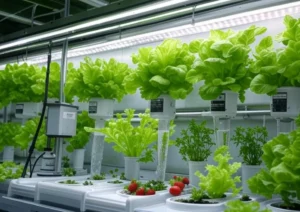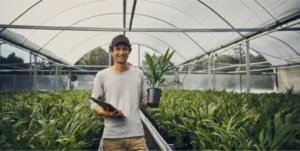
“Do you know that India is among the top 3 countries in the world in bamboo production? Still, our farmers cannot reap the full benefits of bamboo farming! The solution to this problem is the National Bamboo Mission (NBM), which was launched in 2006.”
“NBM is an ambitious initiative of the Indian government designed to promote bamboo cultivation, provide financial support to farmers, and develop bamboo-based industries”
“If you are a farmer, entrepreneur, or person associated with the bamboo industry, this blog is a complete guide. Here, you will know how to get the National Bamboo Mission subsidy, what the key benefits of this scheme are, and how you can earn lakhs from bamboo farming!”
National Bamboo Mission started in which year & under which ministry does it come?
To promote bamboo cultivation in India and strengthen the industries related to it, the Government of India launched the “National Bamboo Mission (NBM)” in 2006-07.
This mission comes under the Ministry of Agriculture & Farmers Welfare of the Government of India.
👉 The main objective of NBM is to promote bamboo cultivation, production, and processing so that farmers can get more profits and bamboo-based industries can be promoted.
Under which ministry was NBM launched?
✅ Initially, it was operated as the National Mission on Bamboo Applications (NMBA) under the Ministry of Science & Technology.
✅ But in 2018, it was restructured and brought under the Ministry of Agriculture & Farmers Welfare.

National Bamboo Mission Strives: A revolutionary initiative for farmers and industries
The National Bamboo Mission (NBM) of the Government of India is working to promote the cultivation, production, and processing of bamboo. The mission is taking several initiatives to strengthen bamboo-based industries in the country, increase farmers’ income, and promote environmental protection.
What are the key areas on which the National Bamboo Mission focuses?
1️⃣ Promoting Bamboo Cultivation
✔️ Farmers are given a subsidy of up to 50-60% for bamboo cultivation, that too at very low interest
✔️ The cooperation of ICAR (Indian Council of Agricultural Research) is taken for the selection and cultivation of the best bamboo species.
✔️ Small and marginal farmers are being linked to bamboo production.
2️⃣ Boosting Bamboo-Based Industries
✔️ Financial assistance is given to bamboo processing units and handicraft clusters.
✔️ Skill development training is given to Bamboo Entrepreneurs.
✔️ Emphasis is being laid on branding and marketing of bamboo products (furniture, paper, charcoal).
3️⃣ Sustainable and Eco-Friendly Growth
✔️ “Bamboo as a Green Gold” is being promoted.
✔️ Bamboo-based products are being promoted to reduce deforestation.
✔️ Awareness campaigns are being run to use bamboo wood in place of traditional timber.
Impact of the efforts of National Bamboo Mission
🔹 The average income of farmers has seen an increase of up to 40%.
🔹 The contribution of the bamboo industry is expected to reach ₹25,000 crore by 2025.
🔹 A target has been set to double the bamboo-based exports in 5 years.
📢 “The National Bamboo Mission is not just limited to promoting bamboo cultivation, but it is a big step towards giving new life to the farmers and environment of India!”
Big benefits of National Bamboo Mission: Golden opportunity for farmers and industries!
This scheme of the Government of India is not only limited to promoting bamboo cultivation, but it is also proving to be revolutionary for farmers, startups, and the environment. Let us know the 5 major benefits of the National Bamboo Mission:
1. Subsidy up to 50-60% on bamboo cultivation for farmers
✔️ Under the NBM scheme, farmers are given a subsidy for bamboo cultivation.
✔️ Small and marginal farmers can earn more profit with less investment.
✔️ Bamboo crop is harvested in 3-4 years and gives continuous production for 50 years.
2. Promotion of Bamboo Industry and new jobs
✔️ Bamboo handicrafts, furniture, the paper industry, and the construction sector are getting benefits.
✔️ Under “Vocal for Local,” products made from bamboo are being promoted in India.
✔️ More than 2 lakh jobs have been created in the country.
3. Helps in environmental protection and climate change
✔️ Bamboo is 35% more effective in absorbing CO₂, which reduces air pollution.
✔️ It helps prevent deforestation and promote sustainable development.
✔️ Bamboo roots prevent soil erosion and help conserve water.
4. Plan to make India a "Bamboo Export Hub."
✔️ A target has been set to double the bamboo export in India in 5 years.
✔️ The demand for bamboo products (furniture, charcoal, paper, toiletries, and decor) is increasing in the international market.
✔️ Bamboo Industry Parks are being developed in Nagpur and other states.
5. Golden opportunity for MSMEs, Startups and Bamboo Entrepreneurs
✔️ The National Bamboo Mission provides funding and training for startups and small entrepreneurs.
✔️ Help is being provided in setting up bamboo processing units for the MSME sector.
✔️ People can earn ₹5 lakh to ₹50 lakh annually by joining Bamboo Business.
How to apply for National Bamboo Mission? (Step-by-Step Process)
Step 1: Check Your Eligibility for National Bamboo Mission
The benefits of the National Bamboo Mission are available to these categories:
✔️ Farmers and farmer groups who wish to cultivate bamboo.
✔️ Individuals wishing to set up bamboo processing units.
✔️ MSMEs and startups who wish to join the bamboo industry.
✔️ Government agencies and research organizations that wish to promote bamboo cultivation.
Step 2: Required Documents for Application
Get the following documents ready before applying:
📌 For farmers:
✅ Aadhaar card and land ownership certificate
✅ Bank account details
✅ Land map and bamboo cultivation proposal
📌 For startups/MSMEs:
✅ Company registration certificate
✅ Business plan and project report
✅ GST and PAN card
📌 For institutions:
✅ Registration/approval certificate
✅ Research or development proposal
✅ Financial details
Step 3: Application Process for NBM
✅ 1. Visit the Official Portal
➡️ First of all, visit the official website of the National Bamboo Mission:
🔗 https://nbm.nic.in/
✅ 2. Register as farmer/entrepreneur/institution
➡️ Website: Go to the “Apply Online” section.
➡️ Select your category (Farmer / Entrepreneur / MSME).
➡️ Register with Aadhaar and a mobile number.
✅ 3. Fill out the Application Form
➡️ Fill in all the required information, such as –
✔️ Land Details
✔️ Bamboo species and cultivation plan
✔️ Subsidy or funding requirements
✅ 4. Upload required documents
➡️ Scan and upload the required documents mentioned above.
✅ 5. Submit and track application
➡️ After applying, you will get an acknowledgment number.
➡️ You can check the status of your application by logging in to the NBM portal.
What Happens After Applying?
- The application will be reviewed by the District Nodal Agency.
- More information or a field inspection may be required.
- After approval, funds/subsidy will be transferred directly to the bank account.
- Training and technical assistance will also be provided for bamboo cultivation and processing.
National Bamboo Mission Success Stories: How farmers and startups changed their fortunes with bamboo?
Did you know? The bamboo industry in India is worth over ₹25,000 crore, and it is constantly growing! The National Bamboo Mission (NBM) has helped hundreds of farmers, entrepreneurs, and startups start bamboo-based businesses. Let’s look at some inspiring success stories that transformed their lives by leveraging NBM.
1. Earning Lakhs From Bamboo Farming – Story of a Rajasthan Farmer
📍 Location: Kota, Rajasthan
📍 Benefits: 50% subsidy on bamboo farming and direct access to market
👉 Ramswaroop Meena, who was earlier into traditional farming, started bamboo farming in 2019 with the help of NBM. He got a 50% subsidy and technical support from the Rajasthan government. In the first year itself, he earned ₹3 lakh from his 1.5 acres of land. Now, he is also making profits by making bamboo-based furniture.
🎯 Learning: If the right technology and government support is used, bamboo farming can be extremely profitable!
2. Bamboo Startup Nagpur: Success Story of an Engineer
📍 Location: Nagpur, Maharashtra
📍 Benefits: ₹10 lakh subsidy for bamboo processing unit
👉 Apoorva Deshmukh, a mechanical engineer, dreamed of making eco-friendly products from bamboo. He started a bamboo processing unit in Nagpur with a subsidy of 10 lakh from NBM. Today he is making bamboo toothbrushes, cups, and handicraft items, which are in demand not only in India but also in Europe!
🎯 Learning: If you are in the MSME sector, you can earn huge profits by opening a bamboo processing unit.
National Bamboo Mission in Rajasthan: Bamboo revolution in the desert!
Rajasthan is generally considered a desert state, but bamboo farming can be successfully developed in some parts of the state. Under the National Bamboo Mission (NBM), the Rajasthan government is supporting farmers and entrepreneurs in bamboo cultivation, processing, and marketing.
1. Promotion of bamboo cultivation
Bamboo cultivation is being encouraged in the Aravalli region, Udaipur, Kota, and the southern districts of Rajasthan.
Farmers are being given subsidies for improved varieties of bamboo (Bambusa Tulda, Bambusa Balcooa, and Dendrocalamus Strictus).
2. Support to bamboo processing and industries
Bamboo processing units are being set up in Jaipur, Jodhpur, and Udaipur to promote bamboo products (furniture, charcoal, packaging, and handicrafts).
Financial support and technology training is being provided to startups and MSMEs.
3. Training programs for farmers and youth
The Rajasthan government is training farmers in modern bamboo farming through Krishi Vigyan Kendras (KVKs).
Bamboo-based entrepreneurship courses are being started in colleges and universities under the Rajasthan Bamboo Mission (RBM).
4. Increasing the use of bamboo
There is an emphasis on increasing the use of bamboo in government schemes, such as bamboo houses in PM Awas Yojana, bamboo furniture, bamboo fencing, and handicrafts.
Bamboo huts and resorts are being built to promote ecotourism in Rajasthan.
.
Conclusion -
The National Bamboo Mission (NBM) is not only for environmental protection but also a golden opportunity for farmers, entrepreneurs, and startups. Bamboo cultivation and industry are growing rapidly with government subsidy, training, and technical support.
Businesses like bamboo-based furniture, packaging, charcoal, and handicrafts can play an important role in employment and self-reliant India. Anyone can become a successful bamboo entrepreneur by taking advantage of the right information and government schemes.
🚀 Now it’s your turn!
👉 Apply to avail the subsidy and training of the National Bamboo Mission!
👉 Subscribe to our blog and get the latest updates!
👉 Share this information with your farmer friends and entrepreneurs!
Now is the time to make bamboo a part of the green economy!
Click to Join Our Free WhatsApp Group and YouTube for Agriculture Updates!
Get daily updates, free study material, and the latest schemes, and connect with other agriculture students and farmers.
People also ask-
The Restructured National Bamboo Mission (NBM) was launched in 2018-19 as a part of the Centrally Sponsored Scheme under the Mission for Integrated Development of Horticulture (MIDH).
1️⃣ Government Support—Avail 50% subsidy under the National Bamboo Mission (NBM) and benefit from relaxed harvesting laws.
2️⃣ Farmer Awareness—Conduct training programs, workshops, and demo farms to educate farmers.
3️⃣ High-Yield Varieties – Promote fast-growing species like Bambusa balcooa and Dendrocalamus asper.
4️⃣ Community & Industry Role – Encourage PPP models, FPOs, and bamboo-based businesses.
5️⃣ Use of Waste Lands – Grow bamboo on degraded lands, riverbanks, and agroforestry models.
6️⃣ Market & Processing – Set up bamboo processing units and develop direct farmer-industry linkages.
🚀 With the
1️⃣ Official Website – Visit the National Bamboo Mission Portal at nbm.nic.in for schemes, guidelines, and latest updates.
2️⃣ Ministry of Agriculture & Farmers Welfare – Check the official website agricoop.nic.in for policy details.
3️⃣ State Agriculture Departments – Contact your local agriculture office for region-specific benefits and subsidies.
4️⃣ Krishi Vigyan Kendra (KVK) – Get expert advice and training on bamboo cultivation and processing.
5️⃣ Publications & Research Papers – Refer to ICAR, ICFRE, and other research organizations for bamboo farming techniques.
6️⃣ Workshops & Training Programs – Participate in government-organized bamboo farming and entrepreneurship programs.
📞 Helpline – Call the National Bamboo Mission helpline or visit the nearest agricultural office for direct assistance.
1️⃣ 50% Subsidy – Financial support for cultivation, nurseries, and processing units.
2️⃣ Job Creation – Boosts employment in farming, handicrafts, and industries.
3️⃣ Market Linkage – Connects farmers with industries for better profits.
4️⃣ Eco-Friendly – Promotes soil conservation and sustainable practices.
5️⃣ . Skill Development – Provides training for farmers and entrepreneurs.
6️⃣ High-Yield Varieties – Supports fast-growing, profitable bamboo species.
7️⃣ Enterprise Growth – Strengthens bamboo-based industries like furniture, paper, and biofuel.
Farmers and entrepreneurs can apply online from the website of the State Agriculture Department or the official website of the Ministry of Agriculture.
Related Post-
Top Agricultural Companies in India (2025) 🌱 – Leaders in Seeds, Fertilizers, & Agri-Tech 🚜
India’s agriculture industry is not just a profession; it accounts...
Read More📋 MPPSC Food Safety Officer Syllabus 2025| Notification Out for 67 Posts
The MPPSC announced 67 vacancies for Food Safety Officers. Suppose...
Read MoreMP PAT 2025: Rulebook out, Get complete Details about Syllabus, Pattern & Preparation Tips
🚜 MP PAT 2025 (Madhya Pradesh Pre-Agriculture Test) is a...
Read MoreSummer Season Vegetables in India: Best Crops & Growing Tips
Summer Season Vegetables in India: A Guide to Thriving Crops...
Read MoreHydroponic Farming Cost: A Complete Guide for Farmers and Agriculture Students
Hydroponic Farming Cost Hydroponic farming is an advanced, soil-less cultivation...
Read MoreAgriculture entrepreneur in India
How to become an agriculture entrepreneur in India: full guidance...
Read More





